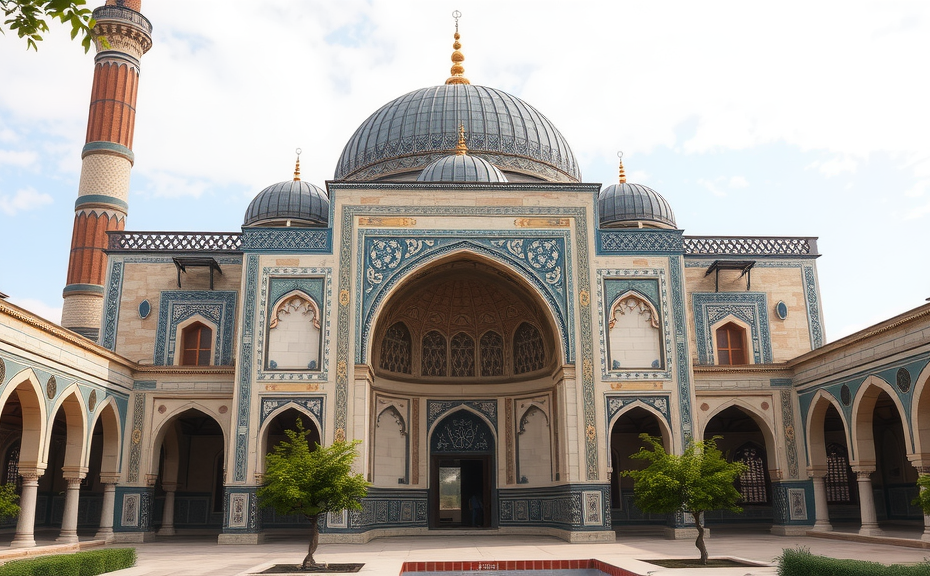The title of Sayyid carries profound historical and spiritual significance within Islamic culture, particularly among Shia Muslims. Traditionally, individuals bearing this title claim descent from the Prophet Muhammad through his daughter, Fatimah, and her husband, Ali.
In this context, lineage plays an important role in establishing a sense of identity and belonging.
Descendants of the Prophet are often viewed as exemplars of moral and ethical conduct, taking on leadership roles within their communities.
Sayyids typically hold a respected position, influencing religious practices and community dynamics. Their unique heritage allows them to engage deeply with Islamic teachings, particularly those concerning authority and governance within the Shia framework.
Sayyid Lineage And Shia Identity
A unique aspect of Islamic heritage involves individuals who can trace their descent to the family of the Prophet Muhammad. These individuals, often referred to as Sayyids, derive their lineage specifically through Fatimah, the Prophet’s daughter, and her husband, Ali.
This heritage provides them with a distinctive status within the Muslim community, frequently regarded as an authority on religious matters.
Sayyids often emerge as spiritual leaders and scholars, deeply rooted in the teachings and values of the Ahl alBayt, which holds a vital place in Shia beliefs.
Cultural practices unique to Sayyids further underscore their role and identity, reflecting traditions that emphasize loyalty to the family of the Prophet and the principles associated with it.
Understanding Sayyids In Islamic Culture
The descendants of the Prophet Muhammad occupy a notable position within Islamic societies, often recognized for their historical and spiritual significance. These individuals, known for their clerical influence, share a lineage traced back to the Prophet’s daughter Fatimah and son-in-law Ali.
Their unique status permeates many aspects of community life, where they frequently assume roles as religious leaders and scholars.
Within the realm of faith, perceptions of this lineage can vary markedly across different sects, particularly between Sunni and Shia interpretations.
In regions like South Asia, the Middle East, and North Africa, historical migrations have contributed to a rich diversity of Sayyids, further complicating their theological identities.
The social advantages associated with this heritage shape community dynamics, often resulting in elevated status and influence in various Islamic traditions. This context leads to a deeper understanding of how clerical leadership can influence community faith and the theological perspectives within various sects.
the Descendants of the Prophet Muhammad
- The descendants, known as Sayyids, are recognized for their clerical influence and often assume roles as religious leaders and scholars.
- There are significant differences in the perception of this lineage between Sunni and Shia interpretations of Islam.
- Historical migrations in regions like South Asia, the Middle East, and North Africa have led to a diverse representation of Sayyids.
- This lineage often results in elevated social status and influence within various Islamic traditions, impacting community dynamics.
Are Sayyids Descendants Of Imam Hasan
The connection of certain individuals to revered historical figures greatly influences their cultural identity within Islamic communities. Sayyids refer to those individuals asserting noble lineage tracing back to Imam Hasan or his brother, Husayn.
This title holds substantial significance in Islamic tradition, particularly among Shia Muslims, where lineage and ancestry are highly valued.
Historical documentation reveals numerous families claiming ancestry from Imam Hasan, illustrating their importance within both cultural and religious contexts.
Such heritage bestows an honorific status, impacting social interactions and community obligations.
Beyond their ancestral ties, Sayyids often serve as influential cultural and religious leaders. Many have gained respect for their contributions to Islamic scholarship and community service, further solidifying their noble identity.
This engagement in community welfare highlights the role of heritage in shaping the Shia community’s values and practices. The intrinsic connection to their forebears fosters a sense of identity that honors their traditions, beliefs, and culture, reflecting the noble legacy they carry forward.
Role Of Heritage In Shia Community
The Shia community’s cultural legacy plays a significant role in shaping its identity and fostering social bonds. This legacy embodies a diverse array of traditions, beliefs, and practices that have been meticulously preserved across generations.
Central to this cultural framework is the importance of ancestral lineage, which directly influences religious affiliation and social hierarchy.
A notable aspect is the connection many Shia Muslims feel to the family of Prophet Muhammad, which fortifies their spiritual beliefs and promotes unity within their communities.
Distinct rituals and commemorations, such as Ashura, are vital in reinforcing these relationships, cultivating a profound sense of belonging among adherents.
These practices not only commemorate historical events but also serve as crucial pillars in understanding Shia jurisprudence, illuminating the faith’s evolution and the significance of its historical context.
| Cultural Aspects | Significance |
|---|---|
| Ancestral Lineage | Influences religious affiliation and social hierarchy |
| Connection to Prophet Muhammad’s Family | Fortifies spiritual beliefs and promotes community unity |
| Ashura Commemoration | Reinforces relationships and cultivates a sense of belonging |
| Understanding Shia Jurisprudence | Illuminates faith’s evolution and historical significance |
Influence Of Ahl AlBayt On Shia Faith
The family of the Prophet Muhammad holds significant importance within Shia doctrine, serving as a source of guidance and moral authority. Within this framework, the Ahl AlBayt are not merely blood relatives but are esteemed as spiritual leaders who embody ethical and theological principles.
Their teachings influence core aspects of Shia beliefs, such as justice and legitimate leadership, establishing a distinct viewpoint that diverges from Sunni interpretations.
Historical figures like Imam Ali, who is regarded as the first rightful leader in Shia thought, and his daughter Fatima, play pivotal roles in shaping the identity and values of Shia Muslims.
The legacy of the Sayyids, who trace their ancestry back to Ahl AlBayt, also holds a significant place within Muslim communities, reflecting the respect accorded to those believed to be heirs of the Prophet’s teachings. These connections underscore the integral role of heritage in shaping the identities and beliefs of diverse Muslim communities, particularly within the historical contexts of the Fatimid, Ismaili, and Zaydi traditions.
How Do Sayyids Contribute To Leadership
The unique lineage of Sayyids endows them with a significant role in various leadership aspects. Their connection to the Prophet Muhammad fosters a revered status within communities, often leading to trust and respect among followers.
Historically, these leaders have served as pivotal figures in mediating social conflicts, utilizing their piety to maintain harmony and cohesion.
This esteemed ancestry not only influences but also shapes social structures, with Sayyids often acting as stabilizing forces within their communities.
They are instrumental in promoting education and cultural practices, disseminating knowledge that aligns with their doctrines and teachings. Through their involvement, Sayyids provide insights into the broader religious context, enriching the understanding of the influence of Ahl AlBayt on Shia faith.
As discussions progress, the role of Sayyid clerical authority in guiding Shia rituals can further illuminate their impact on community cohesion.
The Twelver doctrines, rooted in a rich history of teachings and a profound sense of ancestry and piety, continue to shape the beliefs and practices of millions today.
| Role of Sayyids | Impact on Communities |
|---|---|
| Pivotal figures in mediating social conflicts | Promote harmony and cohesion |
| Instrumental in education and cultural practices | Disseminate knowledge aligned with doctrines |
| Provide insights into the influence of Ahl AlBayt | Enhance understanding of Shia faith |
| Guide Shia rituals through clerical authority | Strengthen community cohesion |
Shia Rituals And Sayyid Clerical Authority
Sayyid clerics occupy a significant space within the Shia community, primarily due to their distinguished lineage that connects them to the Prophet Muhammad. These individuals play a central role during important festivals, such as Ashura, which marks the solemn remembrance of Imam Hussein’s martyrdom.
During these commemorative rituals, Sayyids often take the lead in organizing processions and prayers, gathering communities at shrines dedicated to revered figures.
Their influence extends beyond mere ceremony; they represent the ethics and compassion inherent in the faith, promoting a communal sense of belonging and unity.
Distinctive customs, such as the recitation of specific prayers and narratives, serve to deepen the reverence for the Ahl al-Bayt, further weaving these traditions into the fabric of Shia identity. The dynamics of these rituals not only reinforce spiritual authority but also embody the ethics and compassion intertwined with the reverence for sacred symbols, shrines, and festivals.
The Historical Context Of Sayyid Beliefs
The concept of lineage within Shia Islam plays a significant role in shaping cultural and social dynamics. Rooted in historical narratives, this lineage not only embodies spiritual authority but also influences charitable practices within communities.
Over the centuries, the interplay of unity among various groups fostered rich cultural exchanges, which subsequently impacted political movements.
Unique rituals, such as specific pilgrimage customs, have evolved from these traditions, contributing to the broader Islamic heritage.
In educational institutions, Sayyids often engage as scholars, helping to cultivate a well-informed religious discourse. This ongoing dialogue facilitates continuity and adaptation in faith, revealing the multifaceted identity of Sayyids throughout history.

